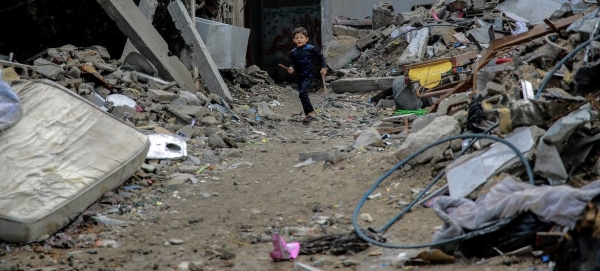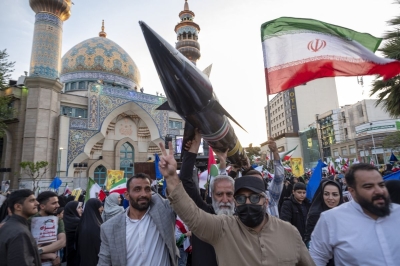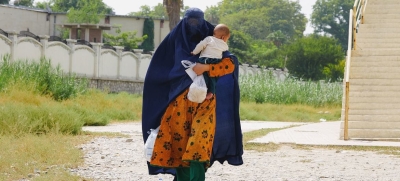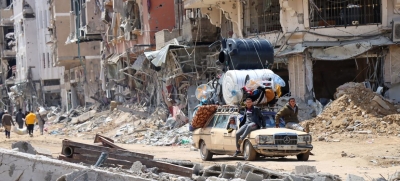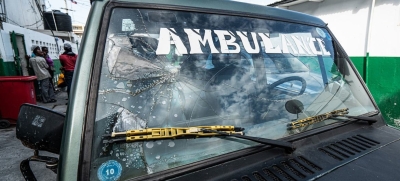Recurring denials and severe access constraints continue to paralyze aid teams trying to respond to the immense needs in northern Gaza, the UN humanitarian affairs office, OCHA, has warned.
The rate of access denials by Israel so far this month marks a “significant deterioration” over December, OCHA said in its latest update, issued late on Wednesday.
Between 1 and 10 January, only three out of 21 planned deliveries of food, medicines, water, and other lifesaving items to the north of Wadi Gaza got through, it revealed.
Denials, delays and insecurity
Partners on the ground were forced to cancel or delay missions in two instances due to excessive delays at Israeli checkpoints or because agreed routes were unpassable.
UNOCHA “Humanitarian partners’ ability to respond to extensive needs in the northern side of Gaza is being curtailed by recurring denials of access for aid deliveries and lack of coordinated safe access by the Israeli authorities,” OCHA said.
The UN agency noted that Israel has denied multiple planned missions this week to deliver urgent medical supplies to the Central Drug Store in Gaza City as well as fuel to water and sanitation facilities, both there and in the north.
‘Significant deterioration’
Since 26 December, requests to reach the Central Drug Store have been denied five times, meaning that “hospitals in northern Gaza remain without sufficient access to life-saving medical supplies and equipment.”
Fuel delivery has been refused six times, leaving people without access to clean water and increasing the risk of sewage overflows and the spread of communicable disease.
“Overall, the rate of access denials seen in January so far presents a significant deterioration when compared to those of December 2023, where more than 70 per cent (13 out of 18) of planned UN missions to the north were coordinated and undertaken, where needs are estimated to be the highest and most severe,” OCHA said.
The agency added that “every day of assistance missed results in lost lives and suffering for hundreds of thousands of people who remain in northern Gaza.”
Meanwhile, OCHA reported that 193 trucks carrying supplies entered the Gaza Strip through the Rafah and Kerem Shalom crossings on 10 January.
A cash-for-work pilot project ran by the UN Children’s Fund, UNICEF, has also started at Al Quds University in north Gaza, where 100 workers will be paid to support the cleaning of solid waste and sanitation over the next three months.

Fighting and fatalities
The update noted that intense Israeli bombardments from air, land and sea continued across much of the Gaza Strip on 9 January, resulting in further civilian casualties and destruction.
Palestinian armed groups also continued to fire rockets into Israel, and ground operations and fighting between the sides were also reported across much of the enclave.
OCHA cited the Gaza health authorities, who said 147 Palestinians were reportedly killed, and 243 injured, between the afternoons of 9 and 10 January. Israel said one of its soldiers was reportedly killed in Gaza during the same period.
The update further noted that the Palestine Red Crescent Society (PRCS) reported that four staff and two injured people were killed when one of its ambulances was struck at the entrance of Deir al Balah on 10 January.
Deadly toll
At least 23,357 Palestinians have been killed, and 59,410 injured, since the start of the conflict on 7 October, according to the Gaza authorities.
The hostilities were sparked by deadly Hamas attacks on southern Israel in which over 1,200 people were killed and more than 200 hostages seized, with roughly 136 still being held in captivity in Gaza.
Since the start of the ground operation, 184 Israeli soldiers have been killed, and 1,076 others injured in according to the Israeli military.
Overall, 1.9 million in Gaza, or nearly 85 per cent of the population, have been displaced, with many families uprooted multiple times as they repeatedly move in search of safety.
More than 1.7 million people are now sheltering in facilities belonging to the UN agency that assists Palestine refugees, UNRWA.

